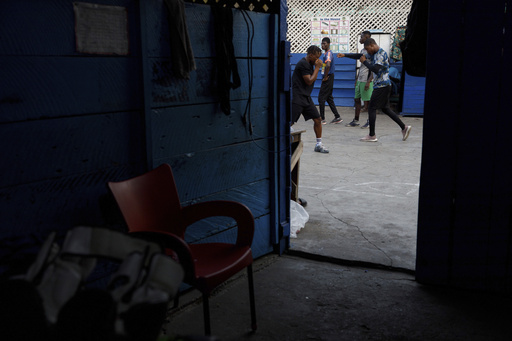ACCRA, Ghana — Abigail Kwartekaa Quartey’s journey into professional boxing began as a bold choice for a teenage girl growing up in the working-class neighborhood of Jamestown in Ghana’s capital. Despite the resistance she faced from her family, who pleaded with her to abandon her training, Quartey remained determined to pursue her passion in a sport traditionally dominated by men.
Jamestown has a rich boxing heritage, sparking pride within the community, but societal norms often discourage women from participating in the sport. Nevertheless, Quartey persisted and made history last year by becoming Ghana’s first female world boxing champion. At the age of 27, she also earned the distinction of being the first woman to travel representing Ghana’s national boxing team.
“My aunts and siblings strongly opposed my decision to train as a boxer. They would often visit my coach, begging him to dissuade me,” Quartey recounted at the Black Panthers Gym, where she has honed her skills since her childhood. Her hard work culminated in November when she claimed the WIBF World Super Bantamweight title after defeating British boxer Sangeeta Birdi, prompting jubilant celebrations in her neighborhood, dispelling the stigma around female boxing—at least for that moment.
While Ghanaian media hailed her victory as a significant milestone, Quartey humbly pointed out that she was not the first woman to step into the boxing ring in Ghana. “There were other women in boxing before me,” she acknowledged, noting that they were often barred from competing at an international level. Her trailblazing success sheds light on the hurdles female athletes encounter in various African nations as they strive to advance in their sporting careers.
In her youth, Quartey contributed to her family’s finances by selling rice with her aunt. Indeed, only her brother, also a boxer, and her coach supported her aspirations. In 2017, financial constraints led her to abandon boxing temporarily, as she turned to selling lottery tickets to sustain herself. It wasn’t until 2021 that her coach managed to persuade her to return to the sport, despite her concerns about managing without a professional advisor.
“Female boxers don’t receive adequate support in Ghana; maintaining consistent training is quite a challenge,” Quartey explained.
The significance of Quartey’s achievement extends beyond individual glory. Sarah Lotus Asare, a boxing coach and lead of the Girls Box Tournament initiative, emphasized that Quartey’s title is a watershed moment for all boxers in Ghana. “Even male boxers struggle against non-Africans due to the disparity in access to better equipment and facilities,” she noted. Her coach, Ebenezer “Coach Killer” Adjei, echoed this sentiment, remarking that Quartey’s accomplishment resonates across her community, the country, and the continent.
For Quartey, the most meaningful aspect is the inspiration she provides for young women in her community. She ardently advocates for more female athletes to rise in the sporting realm, stating, “As a world title holder, I embody the idea that women can achieve what men can.”
Among those inspired by Quartey is 18-year-old Perpetual Okaijah, who faced similar familial opposition when she expressed her interest in boxing. Despite being discouraged, Okaijah continues to train and looks up to Quartey for motivation. “Abigail is incredibly resilient; she serves as a guiding light for me,” she remarked.
Quartey’s legacy is one of defiance against stereotypes, proving that passion, talent, and resilience can pave the way for change, particularly for women in sports.


